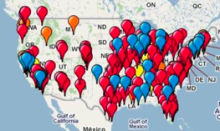Qwest Renews Push to Gut Local Authority over Cable Television
It's 2011 and time for Qwest to renew a push to gut local authority in a number of states - Idaho and Colorado to start. An article for the Denver Post explains the argument:
Phone companies say state-level oversight of video franchising fosters competition because it is less cumbersome for new entrants to secure the right to offer services.
Many states have also eliminated the condition that new video competitors must eventually offer service to every home in a given municipality, a requirement placed on incumbent cable-TV providers.
Gutting local authority is the best way to increase the disparities between those who have broadband and those who do not. Qwest and others are only interested in building out in the most profitable areas -- which then leaves those unserved even more difficult to serve because the costs of serving them cannot be balanced with those who can be served at a lower cost.
The only reason that just about every American living in a city has access to broadband is because franchise requirements forced companies to build out everyone. Without these requirements, cable buildouts would almost certainly have mirrored the early private company efforts to wire towns for electricity -- wealthier areas of town had a number of choices and low-income areas of town had none.
In Idaho, those fighting back against this attempt to limit local authority are worried that statewide franchising will kill their local public access channels - a reality that others face across the nation where these laws have passed.
The channels, which are also used to publicize community events, provide complete coverage of Pocatello City Council, Planning and Zoning and School District 25 board meetings, as well as candidate forums before elections.
Without these local channels, how could people stay informed about what is happening in the community? Local newspapers are increasingly hard to find. In many communities, these channels are the last bastion of local news.



